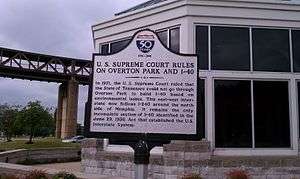Citizens to Preserve Overton Park v. Volpe
| Citizens to Preserve Overton Park v. Volpe | |||||||
|---|---|---|---|---|---|---|---|
|
| |||||||
| Argued January 11, 1971 Decided March 2, 1971 | |||||||
| Full case name | Citizens to Preserve Overton Park, et al. v. Volpe, Secretary of Transportation, et al. | ||||||
| Citations |
91 S. Ct. 814; 28 L. Ed. 2d 136; 1971 U.S. LEXIS 96 | ||||||
| Prior history | Summary judgment for defendant, injunction denied, 309 F. Supp. 1189 (W.D. Tenn. 1970); aff'd, 432 F.2d 1307 (6th Cir. 1970); certiorari granted, 400 U.S. 939 (1970) | ||||||
| Subsequent history | On remand to 335 F. Supp. 873 (W.D. Tenn. 1972) | ||||||
| Holding | |||||||
| The Secretary of Transportation can only approve use of federal funds for construction of a highway in a public park if no (a) feasible and prudent alternative exists, and (b) after undertaking all possible planning to minimize harm. | |||||||
| Court membership | |||||||
| |||||||
| Case opinions | |||||||
| Majority | Marshall, joined by Burger, Harlan, Stewart, White, Blackmun | ||||||
| Concurrence | Blackmun | ||||||
| Dissent | Black, joined by Brennan | ||||||
| Douglas took no part in the consideration or decision of the case. | |||||||
| Laws applied | |||||||
| Administrative Procedure Act; Department of Transportation Act § 4(f), codified at 49 U.S.C. § 1653(f); Federal-Aid Highway Act § 138, codified at 23 U.S.C. § 138 | |||||||
| Wikisource has original text related to this article: |
Citizens to Preserve Overton Park v. Volpe, 401 U.S. 402 (1971), is a decision by the Supreme Court of the United States that established the basic legal framework for judicial review of the actions of administrative agencies. It also stands as a notable example of the power of litigation by grassroots citizen movements to block government action.[1]
Background
The case concerned the decision by the Secretary of Transportation John A. Volpe to construct Interstate 40 through Overton Park in Memphis, Tennessee.
During the interstate highway system's late 1950s and early 1960s building boom, public parks had been viewed as desirable to build through because doing so didn't require the federal government to use the power of eminent domain. That changed in the mid-1960s, under § 4(f) of the Department of Transportation Act of 1966, a federal statute commonly called "Section 4(f)." It required the government to demonstrate that there were no "feasible and prudent" alternatives to building through public lands.
Procedural history
After Secretary Volpe approved the Tennessee Department of Highways proposal to construct the highway through Overton Park, a group called Citizens to Preserve Overton Park brought suit against him in the Western District of Tennessee. They claimed that the Secretary had not complied with §4(f) of the Department of Transportation Act. The Secretary responded by filing a summary judgment motion, which was granted by the court. On appeal, the 6th Circuit affirmed the district court's decision.
Decision
On March 3, 1971, the U.S. Supreme Court ruled on Citizens to Preserve Overton Park v. Volpe, upholding the "feasible and prudent" clause. The Court held that summary judgment was improperly granted. While the Secretary was not required to make formal findings, the Secretary's sole reliance on litigation affidavits was inadequate. The Secretary's decision did not fall into the Administrative Procedure Act's exception for action "committed to agency discretion."[2]
In the decision, Justice Thurgood Marshall stated that Section 4(f) "is a plain and explicit bar to the use of federal funds for construction of highways through parks; only the most unusual situations are exempted."[3] The court recognized the place of cost, directness of route, and community disruption in highway routing, but the existence of the statute "indicates that protection of parkland was to be given paramount importance."[4]

Separate Opinion of Black
Justice Black, joined by Justice Brennan, agreed with the Court that the judgment of the Court of Appeals was wrong and that its action should be reversed. However, they did not agree that the whole matter should have been remanded to the District Court. Rather, Black and Brennan would have remanded the case to the Secretary of Transportation, rather than the district court.[5] "I dissent from the Court's failure to send the case back to the Secretary, whose duty has not yet been performed."
See also
References
External links
- Text of Citizens to Preserve Overton Park v. Volpe, 401 U.S. 402 (1971) is available from: Findlaw Justia
